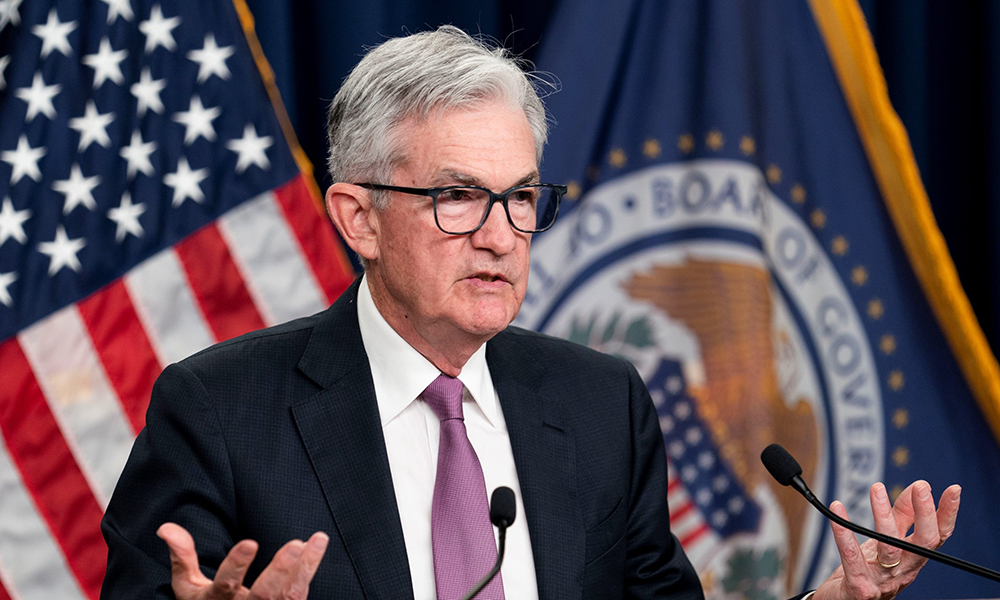
在2008年的金融大危機(Great Financial Crisis)重創(chuàng)美國經(jīng)濟后的幾年里,,華爾街愛上了那句古老咒語:“不要和美聯(lián)儲對著干,?!?/p>
這句話是金融學(xué)教授,、著名投資人馬丁·茨威格于1970年提出的,闡釋了美聯(lián)儲(Federal Reserve)的政策與股市走向之間的強烈相關(guān)性,。
道理很簡單,,大致是這樣的:當(dāng)美聯(lián)儲實施寬松的貨幣政策時,市場往往會走高,,波動性被抑制,,投資者的風(fēng)險是有限的,因此應(yīng)當(dāng)乘勢而上,、持續(xù)投資,。當(dāng)美聯(lián)儲站在你這邊的時候,,為什么要賣出股票,“和美聯(lián)儲對著干”,?
在美國房地產(chǎn)泡沫破裂后的復(fù)蘇過程中,,美聯(lián)儲將利率維持在接近零的水平,實施量化寬松政策,,通過購買抵押貸款支撐的證券和美國國債,,以增加貨幣供應(yīng),希望能夠刺激貸款和投資,,投資者正是掌握了上述原理,,大量買入股票。
央行的寬松政策促成了標準普爾500指數(shù)(S&P 500)歷史上第二長的牛市,,從2009年3月9日直到2020年新冠肺炎疫情引發(fā)熊市,,讓這只藍籌股指數(shù)的投資者獲得了400%的回報。
不過現(xiàn)在,,眼看通貨膨脹已經(jīng)成為美國和世界各地持續(xù)面臨的問題,,美聯(lián)儲的官員采取了新的立場。而這一次的政策對投資者的吸引力要小得多,。
美聯(lián)儲今年已經(jīng)四次加息,,并開始收縮資產(chǎn)負債表,此前數(shù)年的量化寬松政策將其資產(chǎn)規(guī)模推高至近9萬億美元,。目標是為經(jīng)濟降溫,,降低通貨膨脹,但迄今為止,,這些努力尚未取得成效,。
9月13日,美國勞工統(tǒng)計局(Bureau of Labor Statistics)公布,,8月的通脹率再次出人意料地上升,,較上年同期上升8.3%。盡管9月的汽油價格下降了10.6%,,但經(jīng)濟學(xué)家對核心通脹的上升表示擔(dān)憂,,而核心通脹還不包括波動較大的食品和能源價格。
因此,,美國銀行(Bank of America)的經(jīng)濟學(xué)者在9月14日表示,,他們認為美聯(lián)儲將在下次會議上再加息75個基點。野村證券(Nomura)的經(jīng)濟學(xué)家甚至認為,,很有可能加息100個基點,。
全新的含義
Satori Fund的創(chuàng)始人丹·奈爾斯認為,再次加息意味著“不要和美聯(lián)儲對著干”有了全新的含義,。
美聯(lián)儲主席杰羅姆·鮑威爾宣布他將“無條件地”對抗通脹,,華爾街最喜歡的咒語現(xiàn)在成了一句警示,,警告投資者避開股市,或至少采取更保守的投資方式,。
“不要和美聯(lián)儲對著干,,也不要和基本面對著干?!蹦螤査褂?月12日向美國消費者新聞與商業(yè)頻道(CNBC)表示,。他警告投資者,在美聯(lián)儲收緊政策期間出現(xiàn)的任何股市反彈,,對投資者而言都是熊市陷阱,。
奈爾斯是斯坦福大學(xué)(Stanford University)的電氣工程碩士,曾經(jīng)在雷曼兄弟(Lehman Brothers)工作,。自2021年12月以來,,他一直主張投資者應(yīng)該在投資組合中持有大量現(xiàn)金,本周他重申了這一觀點,。
他說:“我認為,,對于那些不能每天交易的散戶來說,就像我們今年一直強調(diào)的,,你寧愿因為通脹而貶值5%到7%,,也不應(yīng)該因為市場下跌而虧掉30%到50%,我認為市場下跌將持續(xù)到明年,?!?/p>
這位對沖基金首席執(zhí)行官在今年3月透露,他已經(jīng)將自己管理的基金中25%的資產(chǎn)配置為現(xiàn)金,。截至今年4月,,他管理著近15億美元的資產(chǎn)。
他在9月12日表示,,該基金還增持了“大量空頭股”,,尤其是“云計算軟件”。
通過做空一家公司,,投資者可以在該公司股價下跌時獲利,。
但奈爾斯也持有一些多頭倉位,他特別強調(diào)了一家在經(jīng)濟衰退期間可能表現(xiàn)良好的公司:沃爾瑪(Walmart),。他指出,,這家零售商在金融大危機期間的表現(xiàn)明顯好于同行和大盤。
不過,,奈爾斯并不看好未來一年的股市。他說,,從歷史上看,,當(dāng)以消費者價格指數(shù)(CPI)衡量的通貨膨脹率高于5%時,,標準普爾500指數(shù)的市盈率會達到12倍。
如今,,標準普爾500指數(shù)的市盈率為19倍,,而通脹率為8.3%,這意味著從歷史基準來看,,股票價格偏高,。此外,奈爾斯認為,,隨著利率上升,,今年企業(yè)收益將繼續(xù)下降。
對投資者來說,,這位對沖基金首席執(zhí)行官的言論應(yīng)該是一個警示,,提醒他們在美聯(lián)儲新的政策環(huán)境下要更加謹慎,因為“不要和美聯(lián)儲對著干”有了全新含義,。(財富中文網(wǎng))
譯者:Agatha
在2008年的金融大危機(Great Financial Crisis)重創(chuàng)美國經(jīng)濟后的幾年里,,華爾街愛上了那句古老咒語:“不要和美聯(lián)儲對著干?!?/p>
這句話是金融學(xué)教授,、著名投資人馬丁·茨威格于1970年提出的,闡釋了美聯(lián)儲(Federal Reserve)的政策與股市走向之間的強烈相關(guān)性,。
道理很簡單,,大致是這樣的:當(dāng)美聯(lián)儲實施寬松的貨幣政策時,市場往往會走高,,波動性被抑制,,投資者的風(fēng)險是有限的,因此應(yīng)當(dāng)乘勢而上,、持續(xù)投資,。當(dāng)美聯(lián)儲站在你這邊的時候,為什么要賣出股票,,“和美聯(lián)儲對著干”,?
在美國房地產(chǎn)泡沫破裂后的復(fù)蘇過程中,美聯(lián)儲將利率維持在接近零的水平,,實施量化寬松政策,,通過購買抵押貸款支撐的證券和美國國債,以增加貨幣供應(yīng),,希望能夠刺激貸款和投資,,投資者正是掌握了上述原理,大量買入股票。
央行的寬松政策促成了標準普爾500指數(shù)(S&P 500)歷史上第二長的牛市,,從2009年3月9日直到2020年新冠肺炎疫情引發(fā)熊市,,讓這只藍籌股指數(shù)的投資者獲得了400%的回報。
不過現(xiàn)在,,眼看通貨膨脹已經(jīng)成為美國和世界各地持續(xù)面臨的問題,,美聯(lián)儲的官員采取了新的立場。而這一次的政策對投資者的吸引力要小得多,。
美聯(lián)儲今年已經(jīng)四次加息,,并開始收縮資產(chǎn)負債表,此前數(shù)年的量化寬松政策將其資產(chǎn)規(guī)模推高至近9萬億美元,。目標是為經(jīng)濟降溫,,降低通貨膨脹,但迄今為止,,這些努力尚未取得成效,。
9月13日,美國勞工統(tǒng)計局(Bureau of Labor Statistics)公布,,8月的通脹率再次出人意料地上升,,較上年同期上升8.3%。盡管9月的汽油價格下降了10.6%,,但經(jīng)濟學(xué)家對核心通脹的上升表示擔(dān)憂,,而核心通脹還不包括波動較大的食品和能源價格。
因此,,美國銀行(Bank of America)的經(jīng)濟學(xué)者在9月14日表示,,他們認為美聯(lián)儲將在下次會議上再加息75個基點。野村證券(Nomura)的經(jīng)濟學(xué)家甚至認為,,很有可能加息100個基點,。
全新的含義
Satori Fund的創(chuàng)始人丹·奈爾斯認為,再次加息意味著“不要和美聯(lián)儲對著干”有了全新的含義,。
美聯(lián)儲主席杰羅姆·鮑威爾宣布他將“無條件地”對抗通脹,,華爾街最喜歡的咒語現(xiàn)在成了一句警示,警告投資者避開股市,,或至少采取更保守的投資方式,。
“不要和美聯(lián)儲對著干,也不要和基本面對著干,?!蹦螤査褂?月12日向美國消費者新聞與商業(yè)頻道(CNBC)表示。他警告投資者,,在美聯(lián)儲收緊政策期間出現(xiàn)的任何股市反彈,,對投資者而言都是熊市陷阱,。
奈爾斯是斯坦福大學(xué)(Stanford University)的電氣工程碩士,曾經(jīng)在雷曼兄弟(Lehman Brothers)工作,。自2021年12月以來,,他一直主張投資者應(yīng)該在投資組合中持有大量現(xiàn)金,,本周他重申了這一觀點,。
他說:“我認為,對于那些不能每天交易的散戶來說,,就像我們今年一直強調(diào)的,,你寧愿因為通脹而貶值5%到7%,也不應(yīng)該因為市場下跌而虧掉30%到50%,,我認為市場下跌將持續(xù)到明年,。”
這位對沖基金首席執(zhí)行官在今年3月透露,,他已經(jīng)將自己管理的基金中25%的資產(chǎn)配置為現(xiàn)金,。截至今年4月,他管理著近15億美元的資產(chǎn),。
他在9月12日表示,,該基金還增持了“大量空頭股”,尤其是“云計算軟件”,。
通過做空一家公司,,投資者可以在該公司股價下跌時獲利。
但奈爾斯也持有一些多頭倉位,,他特別強調(diào)了一家在經(jīng)濟衰退期間可能表現(xiàn)良好的公司:沃爾瑪(Walmart),。他指出,這家零售商在金融大危機期間的表現(xiàn)明顯好于同行和大盤,。
不過,,奈爾斯并不看好未來一年的股市。他說,,從歷史上看,,當(dāng)以消費者價格指數(shù)(CPI)衡量的通貨膨脹率高于5%時,標準普爾500指數(shù)的市盈率會達到12倍,。
如今,,標準普爾500指數(shù)的市盈率為19倍,而通脹率為8.3%,,這意味著從歷史基準來看,,股票價格偏高。此外,,奈爾斯認為,,隨著利率上升,,今年企業(yè)收益將繼續(xù)下降。
對投資者來說,,這位對沖基金首席執(zhí)行官的言論應(yīng)該是一個警示,,提醒他們在美聯(lián)儲新的政策環(huán)境下要更加謹慎,因為“不要和美聯(lián)儲對著干”有了全新含義,。(財富中文網(wǎng))
譯者:Agatha
In the years after the Great Financial Crisis devastated the U.S. economy in 2008, Wall Street fell in love with an old mantra: “Don’t fight the Fed.”
The phrase was coined in 1970 by Martin Zweig, a finance professor and famed investor, to explain the strong correlation between Federal Reserve policy and the direction of the stock market.
It’s a simple idea that goes something like this: When the Federal Reserve’s monetary policy is loose, markets tend to move higher, volatility is subdued, and investors’ risk is limited, so it makes sense to stay invested and ride the wave. Why “fight the Fed” by selling stocks when it’s on your side?
Investors understood this dynamic during the recovery from the bursting of the U.S. housing bubble, buying stocks in droves while the Fed held interest rates near zero and instituted a policy called quantitative easing—where it bought mortgage-backed securities and U.S. Treasuries to increase the money supply in hopes of spurring lending and investment.
The central bank’s loose policies helped bring about the second longest bull market in the S&P 500’s history, between Mar. 9, 2009, and the COVID-19–induced bear market of 2020, leaving investors in the blue-chip index with a 400% return.
Now though, with inflation becoming a persistent issue in the U.S. and around the world, Fed officials have taken a new stance. And this one is far less appealing for investors.
The central bank has raised interest rates four times this year, and begun shrinking its balance sheet after years of quantitative easing pushed its holdings to nearly $9 trillion. Its goal is to cool the economy and reduce inflation, but so far the efforts haven’t been fruitful.
On September 13, the Bureau of Labor Statistics revealed that inflation once again surprised to the upside in August, rising 8.3% from the same period a year ago. Despite a 10.6% drop in gasoline prices during the month, economists are concerned about rising core inflation, which excludes volatile food and energy prices.
As a result, Bank of America’s economists said on September 14 that they believe the Fed will hike rates by another 75 basis points at their next meeting. And Nomura’s economists even argued a 100 basis point rate hike could be in the cards.
A whole new meaning
For Satori Fund founder Dan Niles, yet another interest rate hike means that “Don’t fight the Fed” has a whole new meaning.
With Fed Chair Jerome Powell declaring that his inflation fight is “unconditional,” Wall Street’s favorite mantra is now a warning to avoid stocks, or at least to take a more conservative approach to investing.
“Don’t fight the Fed, and don’t fight the fundamentals,” Niles told CNBC on September 12, warning investors that any stock market rallies that come amid Fed tightening are nothing but bear market traps for investors.
Niles, who holds a master’s in electrical engineering from Stanford and once worked for Lehman Brothers, has argued since December that investors should hold a large portion of their portfolio in cash, and he repeated that call this week.
“I think for the retail investor that can’t daily trade their portfolio, you’re better off losing, as we’ve said consistently this entire year, 5% to 7% to inflation, rather than potentially 30% to 50% to a market decline which I think will continue into next year,” he said.
The hedge fund chief revealed in March that his fund has allocated 25% of its holdings to cash. He managed nearly $1.5 billion in assets as of April.
And on September 12, he said that the fund has also added “a lot of shorts” to its holdings, particularly in ”cloud-oriented software names.”
By shorting a company, investors can earn a profit when its stock falls.
But Niles also holds some long positions, and he emphasized one in particular that could do well during a recession: Walmart, noting that the retailer outperformed its peers and the broader markets substantially during the Great Financial Crisis.
Still, Niles isn’t bullish about the stock market over the coming year. Historically, when inflation, as measured by the consumer price index (CPI), is above 5%, the S&P 500 has traded at 12 times the earnings it generated over the prior year, he said.
Today, the S&P is trading at 19 times trailing earnings with inflation sitting at 8.3%, meaning stocks are expensive on a historical basis. And, on top of that, Niles believes corporate earnings will continue to fall this year as interest rates rise.
For investors, the hedge fund chief’s comments should be a warning to take a more cautious approach in this new environment of Federal Reserve policy, because “Don’t fight the Fed” has a whole new meaning.






